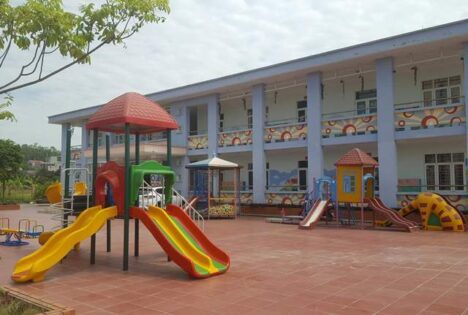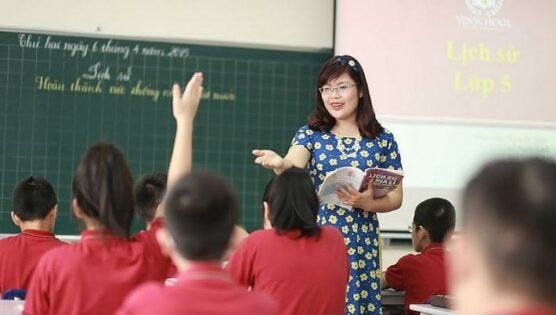Bộ 20 đề ôn thi công chức mầm non môn tiếng Anh 2020 – Phần 4

TEST 17
SECTION A:
In this section you must choose the word or phrase which best completes each sentence. Circle the letter A, B, C or D against the number of each item 1-20 for the word or phrase you choose
- Will you…………….. me to post this letter tomorrow ?
- remember recollect C. mind D. remind
- His work is quite good……………. his sister’s.
- against wish C. compared to D. in comparison
- He’s the man……………. didn’t speak to him once during the
- his wife of which his wife C. of which the wife D. whose wife
- You shouldn’t drop matches or cigarettes ends……………. start
- so that to so as to C. so as not to D. so not as to
- I have designed the kitchen so that my disabled son can reach
- repaired planned C. repainted D. altered
- I’m very impressed by all the work you’ve done on your
- deeply affected embarrassed C. surprised D. confused
- They gave up their jobs to come to this remote area of
- busy high C. modern D. far-away
- In the end we had so little time together that our marriage was breaking
- shortened forgotten C.boring D. coming to an end
- What led you to leave your job and make this trip ?
- told caused C. put D. brought
- The explosion was due to leaking
- caused by before C. causing D. prior to
- I like to see “World News”. That’s my………….
- popular preferable C. favourite D. likable
- People are not so honest as they once were. They are…………….
- as less C. so D. fewer
- There were fewer people in the shop than usual. There were…………
- as many as usual as few as usual C. more than usual D. not as many as usual
- He noticed two thieves……………. out of a
- to come are coming C. in coming D. come
- The car was easy to recognize, so it wasn’t……………. difficult for the police to catch the
- much many C. very D. such
- Mary’s friends will be on the coast. That’s where……………. of them will be.
- more the most C. most D. the more
- We are all very excited………………. are very
- All we Us all C. All us D. All of us
- He was living in France when the war broke out.
- ended burnt out C. occurred suddenly D. spread
- The land and the house that you own are your ………….
- property personal belongings
- movable possessions D. savings
- People…………….. their money because they want their money to grow in
- save put away C. invest D. hide
- A(n)…………….. is a person who sees something and can tell what he or she
- witness observer C. warden D. newsreader
SECTION B
In this section you will find after the reading passage a number of questions or unfinished statements about the passage, each with four suggested answers or ways of finishing. You must choose the one which you think fits best.
By far the most common snake in Britain is the adder. In Scotland, in fact, there are no other snakes at all. The adder is also the only British snake with a poisonous bite. It can be found almost anywhere, but prefers sunny hillsides and rough open country, including high ground. In Ireland there are no snakes at all.
Most people regard snake bites as a fatal misfortune, but not all bites are serious, and very few are fatal. Sometimes attempts at emergency treatment turn out to be more dangerous than the bite itself, with amateurs heroically, but mistakenly, trying do-it-yourself surgery and other unnecessary measures.
All snakes have small teeth, so it follows that all snakes can bite, but only the bite of the adder presents any danger. British snakes are shy animals and are far more frightened of you than you could possibly be of them. The adder will attack only if it feels threatened, as can happen if you take it by surprise and step on it accidentally, or if you try to catch it or pick it up, which it dislikes intensely. If it hears you coming, it will normally get out of the way as quickly as it can, but adders cannot move very rapidly and may attack before moving if you are very close.
The effect of a bite varies considerably. It depends upon several things, one of which is the body-weight of the person bitten. The bigger the person, the less harmful the bite is likely to be, which is why children suffer far more seriously from snake bites than adults. A healthy person will also have better resistance against the poison.
Very few people actually die from snake bites in Britain, and though these bites can make some people very ill, there are probably just as many cases of bites having little or no effect, as there are of serious illness.
- Adders are most likely to be found
- in wilder parts of Britain and Ireland in Scotland and nowhere else
- on uncultivated land throughout Britain D. in shady fields in England.
- If you are with someone who is bitten by an adder you should
- try to catch the adder make no attempt to treat the bite
- not worry about the victim D. operate as soon as possible
- We are told that adders are
- normally friendly towards people unlikely to bite except in self-defense
- aggressive towards anyone in their territory D. not afraid of human beings.
- If an adder hears you approaching, it will usually
- move out of your path take no notice of you at all
- disappear very quickly D. wait until you are close then attack
- We are told that in general British people think snakes are
- not very common in Britain usually harmless
- more dangerous than they usually are D. unlikely to kill people by their bite.
SECTION B : SENTENCE BUILDING
Make all changes and additions necessary to produce, from the following sets of words and phrases, sentences which together make a complete letter.
Dear Diana,
- Thank you / much / your letter / arrive / few days
………………………………………………………………………………………………………………………………………….
- It / be lovely / hear /
………………………………………………………………………………………………………………………………………….
- I / be sorry / I / not write / such / long time / but / I / be very
………………………………………………………………………………………………………………………………………….
- My house / old / it need / repair
………………………………………………………………………………………………………………………………………….
- It / be / very bad condition / and / it / need / a lot /
………………………………………………………………………………………………………………………………………….
- We finish / most / it now / and it look / very
………………………………………………………………………………………………………………………………………….
- Peter and I / decide / give / house-warming party / May 3rd.
………………………………………………………………………………………………………………………………………….
- You think / you / able / come ?
………………………………………………………………………………………………………………………………………….
- Please give me / ring / let / know / you / make
………………………………………………………………………………………………………………………………………….
- I / really / look forward / see you
…………………………………………………………………………………………………………………………………………. SECTION C : SENTENCE TRANSFORMATION
Finish each of the following sentences in such a way that it means exactly the same as the sentence printed before it
- He has to pay the bills before the fifth of the
The bills…………………………………………………………………………………………………………………..
- You remembered posting the letter, didn’t you?
You didn’t ……………………………………………………………………………………………………………….
- It is a six hour flight from London to New
It takes……………………………………………………………………………………………………………………..
- Green said to her son. “ Be careful when you cross the street”
Mrs. Green told…………………………………………………………………………………………………………
- I’m sorry that he isn’t with us now
I wish……………………………………………………………………………………………………………………….
- Unless he phones immediately he won’t get any information. …………………………………………………………………………………………………………………………….
- How long is it since they bought the house? ………………………………………………………………………………………………………………………
- He couldn’t repair the broken vase. …………………………………………………………………………………………………………………………
- The garden still needs
The garden hasn’t……………………………………………………………………………………………………..
- Have you got a cheaper carpet than this?
Is this……………………………………………………………………………………………………………………….
- I can’t get my feet into these
These shoes………………………………………………………………………………………………………………
- I am very pleased that we shall meet again
I am looking……………………………………………………………………………………………………………..
- “Keep away from this area,” said the security guard, when we approach the
The security guard told………………………………………………………………………………………………
- I’ve never met such a famous person before. It’s…………………………………………………………………………………………………………………………..
- This pudding can be cooked in its
You don’t…………………………………………………………………………………………………………………
- John only understood very little of what the teacher
John could hardly………………………………………………………………………………………………………
- Unless someone has a key, we can’t get into a
We can only get………………………………………………………………………………………………………..
- I’m sure you didn’t lock the front door. Here’s the
You can’t………………………………………………………………………………………………………………….
- He prefers golf to
He’d rather……………………………………………………………………………………………………………….
- He is sorry now that he didn’t invite Molly to his
He wishes…………………………………………………………………………………………………………………
TEST 18
SECTION A:
In this section you must choose the word or phrase which best completes each sentence. Circle the letter A, B, C or D against the number of each item 1-20 for the word or phrase you choose
1……………… work is work which is done the same way all the time.
- Routine B. Mental C. Manual D. Office
- When a man……………… a woman at her house, he goes to her house to get
- drops picks up C. drops off D. greets
- When you buy tickets for the concert…………….. , you buy them before the time and day of the
concert.
- in advance in before C. by advance D. ahead
- People have a………………. for special occasions, such as a wedding, a funeral, and a
- meal festival C. dance D. ceremony
- When our friends have bad fortune, we try to show…………
- love sympathy C. embarrassment D. pity
- By next Friday John…………….. five speeches.
- will have given can have given C. will give D. might have given
- We welcome you to our You……………… to our city.
- welcome are welcome C. have welcomed D. are welcoming
- He said that he……………… all day on
- was working will be working C. will have worked D. might have worked
- On December 18th we………………. for fifteen
- shall marry shall be married C. shall be marrying D. shall have been married
10………………. opening my eyes, I saw my own bed with me in it.
- On B. As C. Over D. At
- After……………… from the frightening dream, a doctor examined
- I recovered recovering C. I recover D. recovered
- The students will study the………………
- followed follow C. following D. as follows
- Do you have to buy this hat ? No, I………………… It isn’t necessary.
- mustn’t won’t C. needn’t D. don’t need
- There were no people or houses …………
- in sight at sight C. on sight D. through sight
- Either we’ll have to increase overtime working or………………. new
- take on take off C. take down D. take up
- “How are the pictures ?” “A number of pictures……………… ”
- is are C. do D. does
- The news…………….. as soon as possible.
- releases will release C. will be released D. will have been released
- Television……………… only for the last forty or fifty
- must be existed was excited C. has existed D. has been existed
- “Why didn’t you invite me to go to that dance ?” “Sorry I wish I………………. you to go with us”.
- could invite invited C. have invited D. could have invited
- I suggested…………….. to the
- him in going to make him go C. him to go D. that he should go
- All at once the sky became dark and it started to
- suddenly At times C. occasionally D. Immediately
SECTION B
In this section you will find after the reading passage a number of questions or unfinished statements about the passage, each with four suggested answers or ways of finishing. You must choose the one which you think fits best.
Through a series of experiments an American scientist has obtained an understanding of the social structure of the most complex of ants societies. The ants examined are the only creatures other than man to have given up hunting and collecting for a completely agricultural way of life. In their underground nests they cultivate gardens on soil made from finely chopped leaves. This is a complex operation requiring considerable division of labour. The workers of this type of ant can be divided into four groups according to size. Each of the groups performs a particular set of jobs.
The making and care of the gardens and the nursing of the young ants are done by the smallest workers. Slightly larger workers are responsible for chopping up leaves to make them suitable for use in the gardens and for cleaning the nest. A third group of still larger ants do the construction work and collect fresh leaves from outside the nest. The largest are the soldier ants, responsible for defending the nest.
To find out how good the various size-groups are at different tasks, the scientist measured the amount of work done by the ants against the amount of energy they used. He examined first the gathering and carrying of leaves. He selected one of the size-groups, and then measured how efficiently these ants could find leaves and run back to the nest. Then he repeated the experiment for each of the other size-groups. In his way he could see whether any group could do the job more efficiently than the group normally undertaking it.
The intermediate-sized-sized ants that normally perform this task proved to be the most efficient for their energy costs, but when the scientist examined the whole set of jobs performed by each group of ants it appeared that some sizes of worker ants were not ideally suited to the particular jobs they performed.
- In which way are the ants different from other non-human societies?
- They do not need to search for food They do not need to look for shelters
- Individuals vary in social status D. Individuals perform different functions.
- It seems that smaller ants perform more of the
- construction tasks. domestic tasks.
- defensive work. D. heavy work.
- “Good” (first line of third paragraph) refers to the ants’
- co-operation in working sense of responsibility
- efficiency in working D. willingness to work hard
- The scientist’s work was based on
- occasional observations systematic observations
- observations of several nests D. observations of an undisturbed nest
- The organization of the ants has the effect of
- getting the most work done dividing the work up systematically
- each ant helping with all the tasks D. each ant doing what it can do best.
PAPER TWO: USE OF ENGLISH SECTION A : PASSAGE FOR GAP-FILL
In this section you must find a word to complete the numbered blanks in the passage below. Use only ONE word for each blank.
An Italian was once visiting New York City. He wished to ………………..(26) a walk in ………………..(27) to see the city, but he was ………………..(28) that he would get ………………..(29) because he did not know a ………………..(30) of English. Therefore, ………………..(31) leaving his hotel, he stopped ………………..(32) the first corner and carefully copied ………………..(33) his notebook the name of the street ………………..(34) which his hotel was located. Then he walked ………………..(35). Finally,…………….. (36), he got lost.
Some hours later, he arrived in the police station. After a good deal of confused conversation, an interpreter was called. The Italian explained to the……………………….. (37) that, although he didn’t know
the ………………..(38) of his hotel, he did know the ………………..(39) on which it was located. He then showed the interpreter what he had copied in his ………………..(40). The words which he had so carefully copied were “one-way street”.
SECTION C : SENTENCE TRANSFORMATION
Finish each of the following sentences in such a way that it means exactly the same as the sentence printed before it
- I thought her last name was “Best”, but it was “Past” ………………………………………………………………………………………………………………………………..
- That’s an insulting name to use for
Don’t call……………………………………………………………………………………………………………………….
- John asked if it was the blue one or the green she wanted. ”Which…………………………………………………………………………………………………………………………..
- She like Paris very little, and Rome
She thought Rome……………………………………………………………………………………………………………
- I can meet you if you arrive before eleven. …………………………………………………………………………………………………………………………………
- I’m always nervous when I travel by air. …………………………………………………………………………………………………………………….
- He could not afford to buy the
The car………………………………………………………………………………………………………………………….
- “Why don’t you put your luggage under the seat?” he
He suggested………………………………………………………………………………………………………………….
- Although he had a good salary, he was unhappy in his
In spite………………………………………………………………………………………………………………………….
- He was annoyed because his secretary came late to
He objected……………………………………………………………………………………………………………………
- I’m sorry I missed your birthday
I wish……………………………………………………………………………………………………………………………
- They haven’t cleaned the streets this
The streets……………………………………………………………………………………………………………………..
- Apples are usually cheaper than oranges
Apples are not………………………………………………………………………………………………………………..
- I advise you to put your money in the bank. You’d……………………………………………………………………………………………………………………………
- That restaurant is so dirty that no one wants to eat
It is such………………………………………………………………………………………………………………………..
TEST 19
SECTION A:
In this section you must choose the word or phrase which best completes each sentence. Circle the letter A, B, C or D against the number of each item 1-20 for the word or phrase you choose
- The police officers chased them……………… a field.
- over across C. above D. off
- The house will go………………. sale this
- on by C. in D. through
- Adams can’t see you this week because he is …………
- out from town far of town C. out of town D. away of town
- We’d better check the details……………… they come to see
- so that in order that C. however D. in case
- It was so cold that my fingers were quite …………
- unconscious numb C. hard D. heavy
- Who was the first man to………………. on the Moon ?
- start up board C. set foot D. climb
- In the……………… of rain, the match will have to be put off for a
- event condition C. chance D. fact
- You can’t……………… on me to help you if you find yourself in trouble.
- calculate count C. base D. support
- I was nearly……………… mad by the noise of the aero
- gone led C. got D. driven
- When you come to the cross-road, you will see the………………. showing the way to the
- advertisement announcement C. signpost D. signal
- John was going to join the protest march, but he………………. at the last minute.
- backed out backed up C. ran out D. backed down
- I didn’t feel……………… having a swim this
- as carry C. like D. for
- He has told us more than any……………..
- alive lifeless C. lively D. living
- Any candidate caught…………….. in the exam will be
- deceiving stealing C. cheating D. hiding
- Last Friday he invited three of his friends to come around for a
- go to the pub visit C. return D. go to the restaurant
- Unfortunately, the taxi got stuck in the traffic
- caught arrested C. stopped D. fixed
- What time do you get through work every day ?
- finish begin C. go to D. come back from
- She said that she didn’t have any money at all.
- in the least for good C. at hand D. in the long run
- You will spend at least one year working abroad……………. you can find out how things operate
overseas.
- because so as to C. so that D. as long as
- What food should you eat if you want to…………….. on weight ?
- put take C. get D. turn
SECTION B : SENTENCE BUILDING
Make all changes and additions necessary to produce, from the following sets of words and phrases, sentences which together make a complete letter.
Dear Hamish,
- I / sorry / not / write / so /
…………………………………………………………………………………………………………………………………….
- I / work / very hard / school
……………………………………………………………………………………………………………………………………….
- My course / finish / two week’s time, / I / go /
…………………………………………………………………………………………………………………………………….
- If / enough / money, / go / Ireland / as well
…………………………………………………………………………………………………………………………………….
- I think / best / way / practise / English
…………………………………………………………………………………………………………………………………….
- Be / possible / stay / you / couple / nights ?
…………………………………………………………………………………………………………………………………….
- I / promise / not / be /
…………………………………………………………………………………………………………………………………….
- I / even / some
……………………………………………………………………………………………………………………………………….
Make all changes and additions necessary to produce, from the following sets of words and phrases, sentences which together make a complete letter.
Dear Robert,
- Thank you / letter / I receive / when / get home / last
…………………………………………………………………………………………………………………………………….
- I / be pleased / hear you / after such / long
…………………………………………………………………………………………………………………………………….
- I love / go ballet / with you / but I / not be free / until 6.30 p.m
…………………………………………………………………………………………………………………………………….
- How about come / my flat / and have / something / eat / before / go ?
…………………………………………………………………………………………………………………………………….
- I / not / want / take / my car / because it be / difficult / find somewhere / park
…………………………………………………………………………………………………………………………………….
- Why / we / not go / taxi ?
…………………………………………………………………………………………………………………………………….
- Let hope / dancing be / good as / reviews
…………………………………………………………………………………………………………………………………….
- I / look forward / see you / tomorrow night.
……………………………………………………………………………………………………
TEST 20
SECTION A:
In this section you must choose the word or phrase which best completes each sentence. Circle the letter A, B, C or D against the number of each item 1-20 for the word or phrase you choose
1……………… did he go ? 1,600 miles.
- how long B. how long ago C. how far D. how many further
- This cloth is superior………………
- with to C. in D. for
- I’m tired……………… boiled
- of C. with D. by
- You are welcome……………… any books in the
- to with C. for D. by
- Membership of the club,……………… costs $10,00 a year, is only open to people over the age of
- what which C. that D. this
- My new glasses cost me………………. the last pair that I bought.
- times three three times more than
- three times as much as D. as much three times as
7……………….. eventually brought to the shore, it was found to be very long.
- been B. When being C. on being D. When it was being
- There ………… lots of furniture……………… in the furniture
- are / to display B. is / displaying C. is / on display D. are / displaying
9……………….. the people in our village buy meat everyday.
- just a few B. only some C. not much of D. not many of
- The computer can tell the doctors …………
- to ask which questions which questions asked
- which questions to ask D. questions to ask
- If someone is in your way, he is …………
- interfering in your affair blocking your path
- listening to your advice all are correct
- If I do something in vain, I do it …………
- with success without care C. with care D. without success
- The painting was beautiful. I stood there……………… it for a long time.
- for admiring admire C. admiring D. being admired
- These vegetables don’t taste……………… to
- well deliciously C. freshly D. fresh
- The leader of the party was examining the soil. He was …………
- testing it watching it C. trying it D. looking at it carefully
- She treated me………………. cake, ice-cream and
- with for C. to D. by
- He was accused……………… stealing a
- of in C. to D. with
- It got terribly cold. The cold was …………
- frightening horrifying C. shocking D. frightful
- After……………… by a policeman, he was sent back to
- he picked up been picked up C. picking up D. being picked up
- Is the film worth………………. ?
- to see seeing C. see D. to have seen
- Would you mind……………… me a push ?
- to give giving C. give D. being given
- He opened the letter without……………………….. to read the address on the envelope
- worrying caring C. fearing D. bothering
- There was a big hole in the road which…………………………. the traffic
- held up kept down C. stood back D. sent back
- The boy fell into the river and was……………………….. along by the fast current
- caught swept C. thrown D. swung
- The old sailing boat was……………………….. without trace during the fierce storm
- lost crashed C. disappeared D. vanished
SECTION B : SENTENCE BUILDING
Make all changes and additions necessary to produce, from the following sets of words and phrases,
sentences which together make a complete letter. Dear Mary,
- I / hear / yesterday / you / just / leave / hospital
………………………………………………………………………………………………………………………………………
- This / be / very good news / and / I / relieve / hear / it
………………………………………………………………………………………………………………………………………
- You / have / difficult / time / past / month
………………………………………………………………………………………………………
- Hospital / one / feel / too helpless / do / anything
……………………………………………………………………………………………………………………………………..
- I / hope / you / continue / rest / next few weeks
………………………………………………………………………………………………………
- I/ send / you / today / small / parcel / books and magazines
……………………………………………………………………………………………………………………………………..
- I / like / visit / you / next / Friday / half past two
………………………………………………………………………………………………………
- Please / not / make / special preparations / this visit
………………………………………………………………………………………………………………………………………









